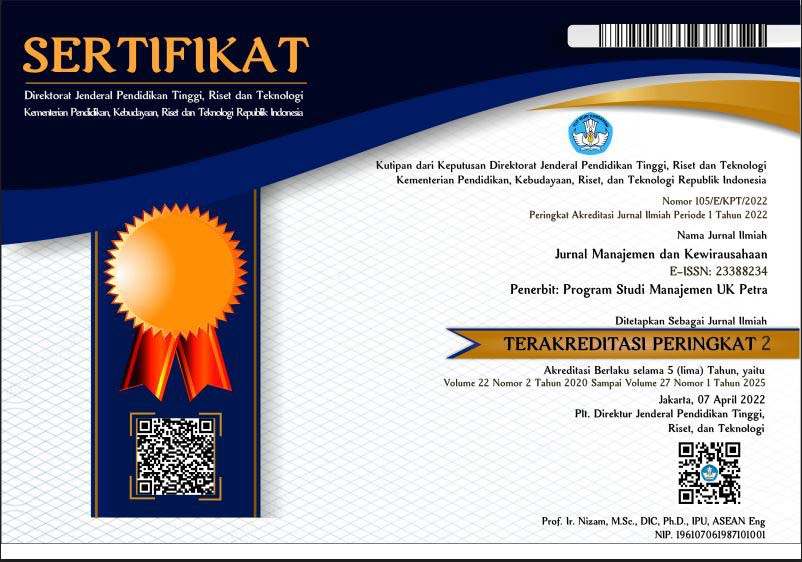SIKAP DALAM MEMEDIASI HUBUNGAN KESADARAN LINGKUNGAN DENGAN NIAT BELI PRODUK KOSMETIK RAMAH LINGKUNGAN
 :
:
https://doi.org/10.9744/jmk.17.2.187-195
Keywords:
Attitudes, environmental awareness, purchase intentionAbstract
The purpose of this study was to determine the role attitudes to mediate the relationship between environmental awareness with the purchase intention eco-friendly cosmetics “The Body Shop” in Denpasar. Samples taken were 105 respondent, used purposive sampling techniques. This study used SEM analysis and the Sobel Test. The results showed that, the higher the environmental awareness tent to increase purchase intention of consumers to buy eco-friendly cosmetics brand “The Body Shop.” However, consumer attitudes did not affect the relationship between environmental awareness with the intention to buy eco-friendly cosmetic products. This suggested that eventhough without any positive consumer attitude. The higher environmental awareness could enhance the purchase intention towards eco-friendly cosmetic products “The Body Shop.”
References
Akehurst, G., Afonso, C., & Goncalves, H. M. (2012). Reexamining green purchase behavior and the green consumer profile: New evidence. Management Decision, 50(5), 972–988.
Albayrak, T., Aksoy, S., & Caber, M. (2013). The effect of environmental concern and scepticism on green purchase behavior. Marketing Intelligence & Planning, 31(1), 27–39.
Ali, S. (2013). Prediksi perilaku ramah lingkungan yang dipengaruhi oleh nilai dan gaya hidup konsumen. Jurnal Perspektif Bisnis, 1(1), 112–125.
Aman, A. H. L., Harun, A., & Hussein, Z. (2012). The influence of environmental knowledge and concern on green purchase intention the role of attitude as a mediating variable. British Journal of Arts and Social Sciences, 7(2), 145–167.
Ardianti, N. T., Fahmi, I., & Ratnawati, A. (2008). Analisis perilaku konsumen bogor terhadap produk kosmetik hijau. Jurnal Manajemen & Agribisnis, 5 (1), 16–22.
Arttachariya, P. (2012). Environmentalism and green purchasing behavior: A study on graduate students in Bangkok, Thailand. Diunduh 1 Maret 2015 dari http://www.bu.ac.th/knowledgecenter/ epaper/july_dec2012/pdf/ac01.pdf.
Ajzen, I. (1991). The theory of planned behavior. Organizational Behaviour and Human Decision Processes, 50(2), 179–211.
Bajari, R. R. (2012). Pengaruh sikap, norma subjektif dan kendali perilaku terhadap kesadaran dan perilaku ramah lingkungan pada tenaga kesehatan di rumah sakit Fakultas Farmasi Universitas Padjajaran Jatinangor. Journal of Environmental Science, 2(4), 103–116.
Barr, S. (2007). Factors influencing environmental attitudes and behaviors. Environment and Behavior, 39(4), 435–473.
Bamberg, S. (2003). How does environmental concern influence specific environmentally related behaviours? A new answer to an old question. Journal of Environmental Psychology, 23(1), 21–32.
Chan, R. (1999) Environmental attitudes and behaviors of consumers in China: Survey findings and implications. Journal of International Consumer Marketing, 11(4), 25–52.
Cheah, I. & Phau, I. (2011) Attitudes towards environmentally friendly products: The influence of ecoliteracy, interpersonal influence, and value orientation. Marketing Intelligence & Planning, 29(5), 452–472.
Chen, T. B. & Leu, T. C. (2010). Towards the environment and green products. Management Science and Engineering, 4(2), 27–39.
Chen, Y. S. (2011). Green organizational identity: Sources and consequence. Management Decision, 49(3), 384–404.
Chen, Y. S. & Chang, C. H. (2012). Enhance green purchase intentions: The roles of green perceived value, green perceived risk, and green trust. Management Decision, 50(3), 502–520.
Darmawan, B., Saam, Z., & Zulkarnaini. (2010). Hubungan pengetahuan, sikap, perilaku dan peran serta dengan kesadaran lingkungan hidup serta kesanggupan membayar masyarakat sekitar bantaran sungai di kota Pekanbaru. Jurnal of Environmental Science, 2(4), 103–106.
D’Souza, C., Taghian, M., Lamb, P., & Peretiatkos, R. (2006). Green products and corporate strategy: An empirical investigation. Society and Business Review, 1(2), 144–157.
Dwyer, R. J. (2009). Keen to be green organizations: A focused rules approach to accountability. Management Decision, 47(7), 1200–1216.
Ghozali, I. (2012). Aplikasi analisis multivariate dengan program IBM SPSS 20. Semarang: Badan Penerbit Universitas Diponegoro.
Harris, P. G. (2006). Environmental perspectives and behavior in China: Synopsis and bibliography. Environment and Behavior, 38(1), 5–21.
Herri, Putri, N., & Kenedi, J. (2006). Analisis persepsi masyarakat terhadap produk hijau: Tinjauan faktor demografi, psikologi, sosial, dan budaya (kasus kota Padang). Jurnal Business & Manajemen, 2(1).
Ishawini. (2011). Proenvironmental concern influencing green buying: A study on Indian consumers. Management Science and Engine International Journal of Business and Management, 6 (6), 124–133.
Junaedi, S. M. F. (2005). Pengaruh kesadaran lingkungan pada niat beli produk hijau: Studi perilaku konsumen berwawasan lingkungan. Jurnal Manajemen dan Bisnis, 9(2), 189–201.
Khare, A. (2014). Consumers’ susceptibility to interpersonal influence as a determining factor of ecologically conscious behavior. Marketing Intelligence & Planning, 32(1), 2–20.
Lee, K. H. (2009). Why and how to adopt green management into business organizations? The case study of Korean SMEs in manufacturing industry. Management Decision, 47(7), 1101–1121.
Mostafa, M. M. (2007). A hierarchical analysis of the green consciousness of the Egyptian consumer. Psychology & Marketing, 24(5), 445–473.
Nugrahadi, E. W. (2002). Pertanian organik sebagai alternatif teknologi dalam upaya menghasilkan produk hijau. Bogor: Institut Pertanian Bogor.
Neoloka, A. (2008). Kesadaran lingkungan. Jakarta: PT Rineka Cipta.
Ng, S. & Paladino, A. (2009). Examining the influences of intention to purchase green mobile phones among young consumers: An empirical analysis. ANZMAC, 1–8.
Oliver, J. D. & Lee, S. H. (2010). Hybrid car purchase intentions: A crosscultural analysis, Journal of Consumer Marketing, 27(2), 96–103.
Ottman, J. A., Stafford, E. R., & Hartman, C. L. (2006). Avoiding green marketing myopia: Ways to improve consumer appeal for environmentally preferable products. Environment, 48(5), 22–36.
Paladino, A. & Baggiere, J. (2008). Are we “green”? An empirical investigation of renewable electricity consumption. European Advances in Consumer Research, 18, 340–341.
Pradipta, Surya, I. B. G., & Suprapti, N, W. (2013). Pengaruh sikap dan norma subyektif terhadap niat calon pemilih di kota Denpasar untuk memilih partai demokrat dalam pemilu legislatif tahun 2014. Jurnal Manajemen, Strategi Bisnis, dan Kewirausahaan, 7(1), 29–39.
Sugiyono. (2013). Metode penelitian bisnis. Bandung: CV Alfabeta.
Suprapti, N. W. S. (2010). Perilaku konsumen: Pemahaman dasar dan aplikasinya dalam strategi pemasaran. Bali: Udayana University Press.
Tilikidou, I. (2007). The effects of knowledge and attitudes upon Greeks’ proenvironmental purchasing behaviour. Corporate Social Responsibility and Environmental Management, 14(3), 121–134.
Teng, L. (2009). A comparison of two types of price discounts in shifting consumers’ attitude and purchase intentions. Journal of Business Research, 62(1), 14–21.
Wang, Z. & Yu, H. (2007). A empirical study of purchasing behaviour on green food. Journal of Anhui Agriculture Science, 35(10), 56–58.
Yeoh, M. & Paladino, A. (2008). Analysing the effects of prestige of environmental attitudes and behaviours upon low-involvement purchase: Does branding matter? Diunduh 1 Maret 2015 dari http://conferences.anzmac.org/ANZMAC2 007/papers/M%20Yeoh_1a.pdf.
Zhou, Y., Thøgersen, J., Ruan, Y., & Guang, H. (2013). The moderating role of human values in planned behavior: The case of Chinese consumers’ intention to buy organic food. Journal of Consumer Marketing, 30(4), 335–344.
Downloads
Published
How to Cite
Issue
Section
License
Authors who publish on this journal agree to the following terms:
- Authors retain copyright and grant the journal right of first publication with the work simultaneously licensed under a Creative Commons Attribution License that allows others to share the work with an acknowledgement of the work's authorship and initial publication in this journal.
- Authors are able to enter into separate, additional contractual arrangements for the non-exclusive distribution of the journal's published version of the work (e.g., post it to an institutional repository or publish it in a book), with an acknowledgement of its initial publication in this journal.
- Authors are permitted and encouraged to post their work online (e.g., in institutional repositories or on their website) prior to and during the submission process, as it can lead to productive exchanges, as well as earlier and greater citation of published work (See The Effect of Open Access).

















